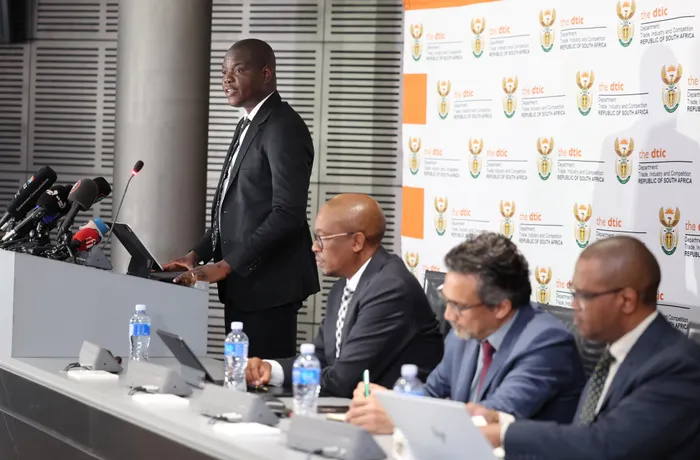SA is no threat to the US, ministers say in response to Trump tariffs

South Africa has been engaging the US at various levels with a view to ensure predictability in trade, Ministers of International Relations and Cooperation, Ronald Lamola and Trade, Industry and Competition, Parks Tau say of Trump's tariffs.
Image: GCIS
The South African government has criticised the United States’ decision to impose a 30% unilateral tariff on local exports, saying it undermines months of efforts to reset trade relations and has been influenced by unnamed “actors”.
In a joint statement, the Ministers of International Relations and Cooperation, Ronald Lamola and Trade, Industry and Competition, Parks Tau, said, “since the beginning of the 7th Administration, South Africa embarked on a process to stabilise and enhance mutually beneficial trade and investment relations with the US. The aim has been to address long-standing bilateral issues of concern for both sides in ways that move the trade relations forward.”
They made the point that South Africa has been engaging the US at various levels with a view to ensure predictability in trade. “However, even with these efforts, the US decided to impose a 30% unilateral tariff on South African exports.
It is unfortunate that this government’s efforts in resetting the relationship with the US has been undermined by some actors within South African society,” the ministers said, without specifying who these “actors” are.
The tariffs took effect from last Friday. Goods already in transit before the effective date that will land in the US by October 5 will remain subject to the current 10% tariff.
As far back as May, South Africa submitted a “comprehensive and ambitious Framework Deal” to Washington aimed at addressing the US trade deficit, tariffs, digital trade, investment and non-tariff barriers, the joint statement said.
The US is South Africa’s second-largest trading partner, accounting for 7.5% of the country’s global exports. The tariffs are expected to add roughly $3.5 billion (R63bn) to the cost of exports to the US, based on 2023 export figures. While platinum and gold are excluded, key exports such as citrus, wine, processed foods and automobiles will be affected.
South Africa’s minimal 0.25% share of total US imports “makes the 30% tariff on our country inscrutable,” the ministers said, adding that “South Africa poses no trade threat to the US economy nor its national security. The calculation of the US-SA ‘trade deficit’ ignores the substantial US trade surplus in services.”
The statement made the point that South African exports “do not compete with US producers” but rather provide “crucial inputs that support America’s own industrial base,” while agricultural exports are counter-seasonal and “fill gaps in the US market”.
The tariffs are expected to weigh heavily on South Africa’s economy. Nolan Wapenaar, co-chief investment officer at Anchor Capital, has previously said, “economists are all modelling to estimate the impact and, from what I am seeing, this will shave about 0.7% off economic growth. Just not nice.” This would lower growth to 0.3% for the year, down from an already weak 0.1% in the first quarter based on a recent International Monetary Fund projection of 1% for the full year.
To cushion the impact, government has announced several measures, including an Export Support Desk to help companies diversify into new markets, a Block Exemption for Exporters to enable collaboration, and an Export and Competitiveness Support Programme to provide financial support.
Government is also set to soon announce details of measures to assist companies absorb the tax.
South Africa is also stepping up efforts to deepen ties with alternative markets. Recent initiatives include a R90bn Clean Trade and Investment Partnership with the European Union, new agricultural export protocols with China and Thailand, and trade expansion into the Middle East and Asia.
“With China alone being a $200 billion market, we are confidently expanding our reach and creating new opportunities for our agricultural producers,” the ministers said.
They noted that “South Africa’s economic future is resilient, and we are working tirelessly to secure it,” adding that the government will continue to negotiate with the US to reach a “mutually beneficial trade deal”.
IOL